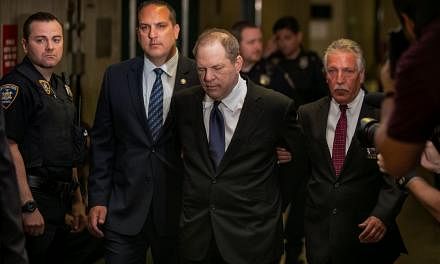(NYTimes) - Ms Gina Pitre had come to dread working at Walmart. A manager, she said, used to touch her inappropriately and make suggestive comments.
Ms Pitre, 56, who earned US$11.50 an hour fulfilling online orders in D'Iberville, Mississippi, said she felt degraded and angry.
She saw a television news segment this winter about how female Hollywood stars and producers had started Time's Up, a group to help women combat harassment. A related initiative, the Time's Up Legal Defence Fund, connected Ms Pitre with a lawyer and is helping fund her lawsuit against Walmart and one of its managers.
Hollywood, it appears, is starting to make good on its promise to focus on women outside the limelight and broaden the #MeToo movement.
Filed last month, the lawsuit, one of the first to arise from the Time's Up fund, is part of a multi-pronged approach. Beyond the various legal aspects, the group is working with labour and social activists, as well as communications specialists and others, to publicise the struggles of working women facing harassment on the job.
Actress Susan Sarandon, along with Ms Pitre, female Walmart workers and labor activists, signed a letter to the retailer's chief executive, demanding changes in the company's policies and procedures around harassment.
"I don't care who you are," said Ms Pitre, who left her job at Walmart last month. "There is no cause for disrespect."
In a statement, Walmart said it had conducted a "comprehensive investigation" into Ms Pitre's complaints and "could not substantiate a violation of our Discrimination and Harassment Prevention Policy". "We do not tolerate discrimination or harassment of any kind and thoroughly investigate all sexual harassment allegations," the statement added.
Since its launch in January, the Time's Up fund - which is administered by the National Women's Law Centre in Washington - has raised about US$22 million in donations to help pay for legal representation and other assistance for women facing harassment.
So far, about 2,700 workers have contacted the fund, saying they have been harassed. The largest number of complaints, about 9 percent, have come from the arts industry, followed by workers in the federal government, education and health care. Retail workers made roughly 5 percent of the complaints.
Volunteers at the National Women's Law Centre, an advocacy group focused on women's rights, have been reviewing the online complaints and providing many workers with names of lawyers who might be willing to take on their case. The law centre does not vet the facts of each case, but relies on the workers' lawyers to make sure the claims are sound.
When deciding on funding, the staff uses a set of "priorities", including whether the worker is in a low-wage job or in a male-dominated occupation.
"We hope to send a message to employers," said Ms Emily Martin, the law centre's general counsel. "Just because a woman doesn't have a lot of money or connections doesn't mean someone isn't going to stand up for them." The assistance from Time's Up is relatively modest - about US$3,000 to help pay the initial lawyer fees. If the case goes to trial, the fund will provide up to US$100,000 for fees.
Ms Martin said it was difficult to track how many lawsuits had arisen from the Time's Up campaign in the roughly five months since it was started.
One of the early lawsuits was filed by a medical resident who said she had been forced out of her programme after reporting harassment. Martin said the woman did not want her name disclosed.
In some cases, publicity is part of the strategy. The National Women's Law Centre will provide "communications support" - connecting women with public relations specialists - to help them call attention to their story.
Towards that end, the law centre connected Ms Pitre with Our Walmart, a worker advocacy group. This month, Our Walmart sent the letter signed by Ms Pitre and Sarandon to Walmart's chief executive, Mr Doug McMillon, calling on the retailer to revamp its harassment procedures.
When Ms Pitre started working at Walmart in June 2016, she liked the job, she said. But after a few months, a supervisor started to harass her, including instances when he grabbed her breasts and made "unwelcome sexual comments", according to her lawsuit.
Last July, she reported the harassment to a company ethics department, her lawsuit says. She said she was eventually told that the company's investigation was closed, but was never told the outcome.
A Walmart spokesman said the company does not disclose the outcomes of its harassment investigations to anyone, including the employee filing the complaint. The spokesman said this policy is aimed at the "privacy and confidentiality of all concerned". In its letter, Our Walmart demands that the company start informing employees about the results of its harassment investigations.
Pitre had previous experience with harassment. In 2008, she filed a lawsuit in federal court, accusing her former managers at the Boomtown Casino in Biloxi, Mississippi, of groping her and making sexually suggestive comments, according to her lawsuit.
The case resulted in a confidential settlement and "the termination and/or discipline of certain parties at Boomtown Casino", a company spokesman said in an email.
Ms Martin said she was not aware of Ms Pitre's earlier lawsuit when the Time's Up fund approved funding for her Walmart case. But Ms Martin said it would not have been a factor in the decision.
"It is not shocking that this job is not the first job where Gina has experienced some sort of harassment," Martin said.
The Jackson, Mississippi, office of the Equal Employment Opportunity Commission said it had been "unable to conclude" that the "information obtained" in Ms Pitre's case showed that Walmart had broken the law. The agency added that its ruling did not mean Walmart was "in compliance with the statutes", either.
Ms Pitre had hired a previous lawyer, but parted ways with her after, she said, the lawyer was hesitant about pursuing a case against Walmart.
The National Women's Law Centre put Ms Pitre in touch with Mr Louis H. Watson Jr., who has had success with harassment claims. A few years ago, he represented a group of female firefighters who said they faced unwanted advances and crude taunts by male supervisors in Jackson. After a jury found in the women's favour, the city agreed to pay them tens of thousands of dollars each and improve its harassment policies.
Still, harassment cases face an uphill battle in places like Mississippi, Mr Watson said. "It is such a conservative state," he said. "There are not many lawyers who want to take on these claims."










